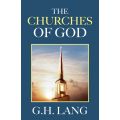Description
If you've ever wondered what the churches of the New Testament looked like - how they functioned, how they were governed, how they conducted their evangelistic and missionary enterprises, what ordinances they observed, what their liturgy consisted of, how decisions were made, how discipline was administered; if you've ever wondered how far modern churches have drifted from the New Testament pattern; if you've ever wondered what it would take for your church, and others like it, to return to the New Testament model, or if such a thing is even possible or desirable - then this book is for you!
G. H. Lang's ability to elucidate Biblical truth was never more evident than in this small treatise on the constitution, government, discipline and ministry of the church of God. His gifts as a diligent Bible student, expositor, and precise thinker, together with his many years of experience as an itinerant Bible teacher in many different countries and cultural settings, all combine to make this a go-to reference on many issues relating to the local church.
Read Sample: Chapter 9: Ministry and Oversight
About the Author
G. H. Lang (1874-1958) was a gifted Bible teacher and prolific author who in his early life was associated with the “exclusive” branch of the Plymouth Brethren but later affiliated himself with the Open Brethren. He traveled widely as an itinerant Bible teacher, depending solely on God for his support. Although Mr. Lang himself was a prolific author, it was his belief that “no man should write a book until he is 40. He needs to prove his theories in practice before publishing.” In his own case, all but nine of his many books were written after he was 50. Kingsley Press has recently re-published Lang’s amazing autobiography, An Ordered Life.



